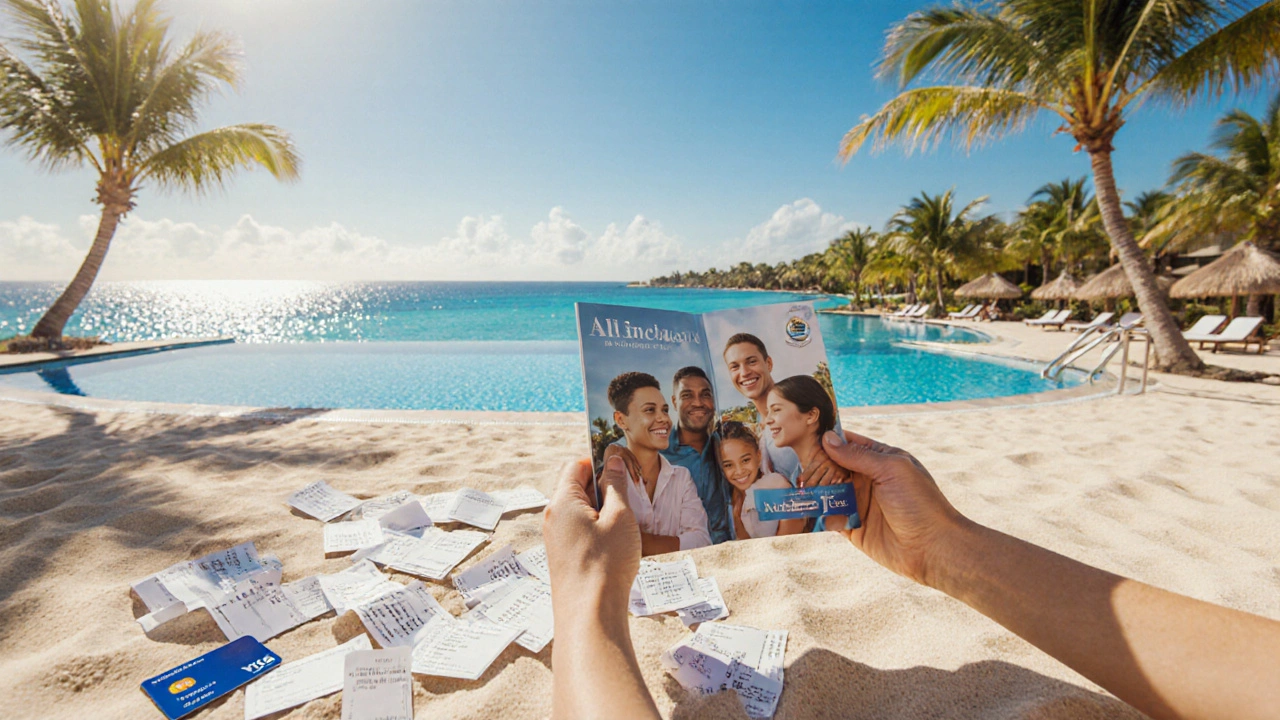All-Inclusive Hidden Fees Calculator
Calculate Your Potential Extra Costs
Estimate additional expenses that often get overlooked in all-inclusive packages
Key Takeaways
- All‑inclusive packages can hide extra fees that bite into your budget.
- You may miss authentic local food and culture.
- Resorts often get crowded, limiting privacy and personal space.
- Food quality and service can suffer when everything is "all you can eat".
- Environmental impact and waste are higher than at smaller hotels.
- Rigid itineraries restrict spontaneous travel plans.
When you book a All‑inclusive hotel is a type of resort that bundles accommodation, meals, drinks and many activities into a single price, the promise of a stress‑free vacation looks very appealing. Yet behind the glossy brochure lies a set of drawbacks that can turn a dream stay into a regretful experience. Below we break down the most common disadvantages of all-inclusive hotels so you can decide whether the convenience outweighs the cost.
Hidden Costs That Sneak In
Most travelers assume ‘all‑inclusive’ means “pay once, enjoy everything.” In reality, many resorts tack on hidden fees that appear after you’ve already checked in. Typical extras include:
- Resort or service charges (often 10‑15% of the total bill).
- Premium alcohol brands that sit outside the standard bar tab.
- Specialty restaurants that charge a cover or à la carte menu.
- Wi‑Fi access, especially in high‑speed zones, which can be billed per device.
These charges can increase the total spend by 20‑30% without warning. If you’re traveling on a strict budget, it’s worth requesting a detailed breakdown of what’s truly included before you sign the contract.
Missing Out on Local Cuisine and Culture
All‑inclusive resorts usually serve a buffet style dining experience that offers a wide array of international dishes. While variety sounds great, it often means the kitchen prioritises quantity over authenticity. Traditional dishes, street food, and regional specialties are replaced by generic versions that travel well but lose their cultural edge.
If tasting local flavor is a top priority, consider spending at least one meal a day at a nearby market or family‑run restaurant. This not only enriches your palate but also supports the local economy-something many all‑inclusive resorts overlook.
Overcrowding and Limited Personal Space
Because the price includes unlimited access to pools, beaches, and entertainment venues, popular all‑inclusive resorts can become packed, especially during peak season. Common issues include:
- Long waits for lounge chairs or poolside cabanas.
- Noisy open‑air bars where quiet conversation is impossible.
- Limited availability of popular activities such as snorkeling trips or yoga classes.
When the resort is at capacity, the promise of a relaxing escape quickly fades into a crowded party atmosphere. Travelers who value privacy often feel cramped.

Compromised Food Quality and Service
Buffet‑style operations rely on mass production. To keep costs down, many resorts serve dishes that are pre‑prepared hours in advance and kept warm under heat lamps. This can lead to:
- Soggy salads and wilted vegetables.
- Stale bread and pastries that lose freshness quickly.
- Inconsistent hot‑food temperatures, affecting taste and safety.
Service staff also face high turnover, meaning you might encounter less‑experienced servers during breakfast rushes. If you expect restaurant‑level dining, the all‑inclusive model may disappoint.
Environmental and Sustainability Concerns
All‑inclusive resorts generate substantial waste due to constant food preparation, disposable plastics, and high energy consumption. Some specific impacts include:
- Large volumes of single‑use toiletries and minibar bottles.
- Excessive water usage for pools, landscaping, and laundry.
- Food waste from over‑produced buffet lines.
While a few resorts implement green programs, the majority still lag behind smaller boutique hotels that can manage resources more responsibly. Eco‑conscious travelers should research a resort’s sustainability certifications before booking.
Limited Flexibility and Spontaneity
All‑inclusive packages lock you into a schedule of pre‑planned activities, from scheduled entertainment shows to timed poolside aerobics. This rigidity can be problematic when you want to:
- Explore nearby towns or natural attractions.
- Change dining times to enjoy a sunset meal on a local beach.
- Take a day‑trip that falls outside the resort’s offered excursions.
Because many resorts charge extra for off‑site tours, you may feel forced to stay on the property, missing out on unplanned adventures that make travel memorable.
Not Ideal for All Traveler Types
While families with children often love the convenience of kid‑clubs and all‑day meals, solo travelers or couples seeking romance may find the atmosphere too generic. Consider these scenarios:
- Couples seeking privacy: All‑inclusive resorts can feel crowded, and many romance‑focused activities are group‑oriented.
- Adventure seekers: The packaged nature of activities may limit the chance to pursue off‑the‑beaten‑path experiences.
- Budget travelers: Hidden fees and premium upgrades can erode the cost advantage.
Matching the resort type to your travel style is crucial to avoid feeling out of place.

Quick Checklist Before You Book
- Ask for a full list of what’s *actually* included, including taxes and resort fees.
- Research the resort’s food quality reviews - look for mentions of fresh, locally sourced options.
- Check the occupancy rate for your travel dates; high occupancy often means crowds.
- Verify the resort’s environmental policies - certifications like Green Key or EarthCheck add credibility.
- Make a plan for at least one off‑site activity to experience authentic local culture.
Side‑by‑Side Comparison of Common Disadvantages
| Disadvantage | Impact on Traveler | Typical Mitigation |
|---|---|---|
| Hidden fees (resort tax, premium drinks) | Budget overruns by 20‑30% | Request itemized cost breakdown before booking |
| Generic buffet food | Loss of authentic culinary experience | Schedule at least one local restaurant meal per day |
| Overcrowded amenities | Long waits, reduced privacy | Travel in shoulder season; use off‑peak hours |
| Environmental waste | Higher carbon footprint, plastic pollution | Choose resorts with verified green certifications |
| Rigid activity schedule | Limited spontaneity | Book independent tours outside resort package |
Final Thoughts
All‑inclusive hotels can be an excellent choice for families or travelers who crave convenience and predictability. However, the very features that make them attractive-one‑price packaging, on‑site amenities, and included meals-also create the pitfalls outlined above. By understanding these disadvantages and planning ahead, you can either avoid the downsides or decide that another type of accommodation better fits your vacation goals.
Frequently Asked Questions
Are all drinks really included in an all‑inclusive package?
Most resorts include soft drinks, house wines, beer, and standard spirits. Premium brands, top‑shelf liquors, and specialty cocktails are often extra.
Can I leave the resort and still keep the all‑inclusive price?
You can leave, but any meals or drinks you consume off‑site are not covered. Some resorts offer half‑board or flexible plans if you intend to explore locally.
Do all‑inclusive resorts have kids’ clubs?
Most family‑oriented all‑inclusive properties provide supervised kids’ clubs, but the quality varies. Look for reviews that mention staff qualifications and activity variety.
How can I reduce the environmental impact of staying at an all‑inclusive resort?
Choose resorts with recognized green certifications, reuse towels and linens, avoid single‑use plastics, and support any on‑site recycling programs.
Is it worth paying extra for a la carte restaurants within an all‑inclusive resort?
If you crave higher‑quality or specialty cuisine, the extra cost can be justified. Check the menu and pricing beforehand to avoid surprise charges.
